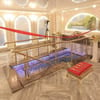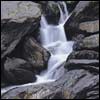The Jewish table is likened to an altar, its holiness compared to that of the Beit Hamikdash (the Holy Temple). Before dishes and utensils can be used in the kosher kitchen, they must acquire an additional measure of holiness which is conferred through the ritual immersion in a pool of naturally gathered water, or mikvah. A mikvah is a specially constructed ritual pool connected to a source of pure rainwater. Vessels may also be immersed in certain natural bodies of water such as the ocean. The procedure is known as tevilah, or toveling (derived from the Hebrew tovel, to immerse).
Immersion in a mikvah is required only for utensils that were manufactured or ever owned by a non-Jew. Even those that were previously used without having been immersed still require immersion, after thorough cleaning, and koshering if necessary.
Preparation for immersion consists of the removal of any substance that would intervene between the water of the mikvah and the surface of the utensil, such as dirt, rust, stickers, glue from labels, and price markings. Steel wool and/or acetone (nail polish remover) are sometimes needed to remove all traces of surface markings.
Types of Vessels Requiring Immersion: A vessel made of metal or glass with which one eats, drinks, cooks, roasts, fries, or heats up water for drinking requires immersion with a blessing. Examples of vessels requiring immersion with a blessing include: Correlle dishes, silverware, pots and pans, glazed china, kettle, and those parts of a mixer or blender which come into direct contact with food.
When immersing several items, only one blessing is said prior to the immersion.
BA-RUCH A-TAH ADO-NOI ELO-HAI-NU
ME-LECH HA'O-LAM A-SHER
KID-SHA-NU B'-MITZ-VO-TAV V'TZI-VA-NU
AL TE-VI-LAT KE-LI (KAI-LIM).
Blessed are You, L-rd our G‑d, King of the Universe, Who has sanctified us with His commandments, and commanded us concerning the immersion of a vessel (vessels).
Items Made of Two or More Materials: When a utensil is made of two different materials, only one of which requires immersion, immersion is usually required. (Examples include glazed earthenware, pans with a non-stick coating, wooden handled utensils and Thermos containers).
Utensils Made From Plastic: Plastic items technically do not require immersion. Nevertheless, there are some who have the custom to immerse plastic utensils without a blessing.
Utensils that do not require immersion are: (1) those made of wood, paper, bone, or unglazed earthenware; or (2) disposable utensils such as plastic cups or plates which are not fit for long-term use and which one normally discards after using.
Learn more in this in-depth article.







Join the Discussion